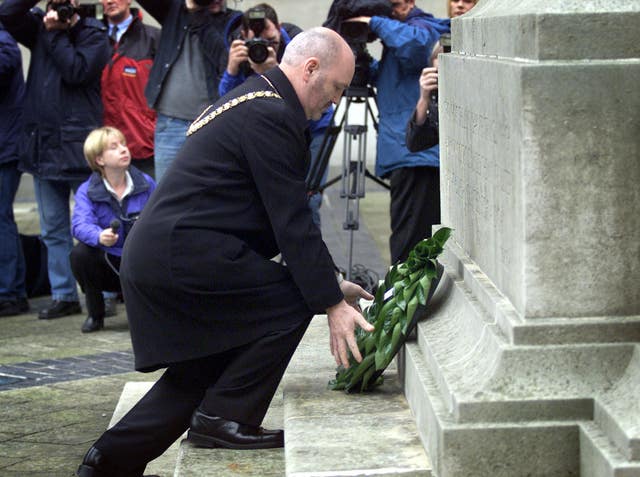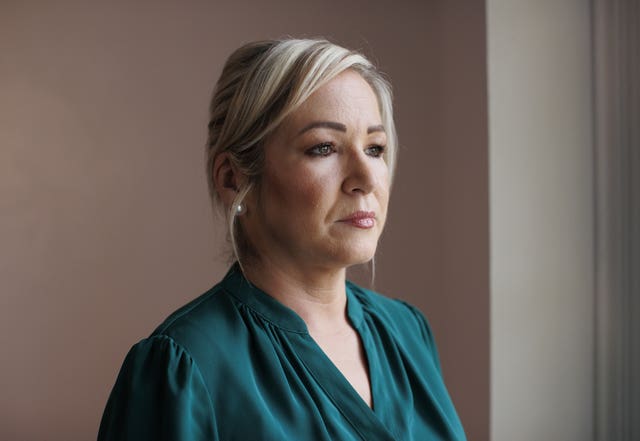Michelle O’Neill to break new ground by attending Remembrance Sunday in Belfast
The Sinn Fein vice president said her participation in the ceremony was a fulfilment of her pledge to be a ‘First Minister for all’.

Stormont’s First Minister Michelle O’Neill is to participate in the Remembrance Sunday ceremony at Belfast City Hall – the first time a senior Sinn Fein figure will take part in such an event in Northern Ireland.
The Sinn Fein vice president said her attendance was a demonstration of her determination to fulfil her pledge to be a “First Minister for all”.
Ms O’Neill, who will lay a laurel wreath at the Cenotaph in Belfast in her role as First Minister, will attend with DUP deputy First Minister Emma Little Pengelly.
In an interview with the PA news agency, the First Minister said she appreciated some republicans would be “uncomfortable” with her being there, but she insisted it was nevertheless the “right thing to do”.

“Back in February, it was a moment of progress and equality here when I became the first nationalist, republican First Minister and I made very firm pledges at that time that I would represent everybody in society,” she said.
“So when I got this invitation to attend remembrance events this weekend, I thought it was important to take that invitation up because that for me is the fulfilment of my commitment to those people out there from a British and unionist identity who hold this important Remembrance Day very carefully to their own heart.
“So, for me, this is about acknowledgement of loss, but it’s also about being respectful to all those people out there and fulfilling my commitment to be First Minister for all.”
She added: “I think it’s going to be an uncomfortable thing for many republicans out there. I mean I think that’s understandable.
“But, you know, I pledged to be a First Minister for all. I think it’s important at times like this, not least when you take a look around the world and what’s happening, the conflict, the world at war with itself, not least what’s happening in Palestine and the genocide of people there, that people need to lead.
“I am a leader. I’m a First Minister for everybody in this society.”

Sinn Fein’s approach to remembrance events linked to the British armed forces has evolved gradually since the signing of the Good Friday Agreement of 1998, beginning in 2002 when the then Sinn Fein Lord Mayor of Belfast Alex Maskey laid a laurel wreath at the Cenotaph at City Hall on the July anniversary of the Battle of the Somme.
The republican party has gone on to participate in Armistice ceremonies in Belfast while Sinn Fein President Mary Lou McDonald and Ms O’Neill have both attended an annual church service in St Patrick’s Cathedral in Dublin to mark Remembrance Sunday.
In 2016, the late Martin McGuinness, who was then Stormont deputy First Minister, visited two First World War battle sites – the Somme in France and Flanders in Belgium. The former IRA commander turned political leader said the visits were made in the “spirit of reconciliation”.
However, until now, the party’s leadership has declined to participate in Remembrance Sunday ceremonies in Northern Ireland, previously citing concerns about excessive British military trappings on show at the events.
Remembrance Sunday also holds an added significance in the context of the Troubles, due to the IRA’s notorious bomb attack in Enniskillen in Co Fermanagh in 1987.
The no-warning blast at the town’s war memorial, as crowds gathered for the annual ceremony, killed 11 people – with a 12th victim dying years later having never woken from a coma.
Asked about how IRA victims may respond to her attendance on Sunday, Ms O’Neill said: “I’ve said it now on a few occasions that I regret every single loss of life. There’s nothing poetic or romantic about war. War is horrible. People lost loved ones, and for this weekend in particular, I think it’s important, because this is, for me, about an acknowledgement of all loss.”
She added: “I’m always comfortable in saying that I am sorry that any single person lost their life in conflict. But, for me, this is an opportunity this weekend to demonstrate that commitment to a shared society, that shared understanding of acceptance in terms of remembrance, that acceptance in terms of the fact that we have a contested past in many ways and contested narratives in many ways as well. But for me, this is about leadership.”
Asked about families whose loved ones were killed by British soldiers during the Troubles, and how they might respond to her attendance, the First Minister spoke of a desire to “create space” for everyone to remember their dead.
“We’re 26 years post the Good Friday Agreement and our own peace agreement, and how precious that is to us all,” she said.
“I also contend that everybody has a right to remember their dead, and I think we need to create the space for all of our people out there to remember their dead in a way that they feel is respectful and appropriate to them. Let’s create space for each other.”
Ms O’Neill’s move comes 14 years after then Fine Gael leader Enda Kenny became the first taoiseach to attend a Remembrance Day service in Northern Ireland when he took part in commemorations at Enniskillen in 2012.
He began a tradition that has been continued by Mr Kenny’s successors as Irish premier.
Their attendance has been symbolic of the greater recognition now afforded in the Republic of Ireland to those Irishmen who fought and died serving in the British Army in the First World War.
Ms O’Neill’s announcement comes in the week when the date of the forthcoming Irish general election will be announced.

She insisted her decision was not linked to electoral politics south of the border.
“Since I pledged to be a First Minister for all, I’ve lived up to that commitment at every turn,” she said.
“I intend to take that opportunity at every turn to represent everybody fairly equally and in a very inclusive way in our society. This, to me, is about nothing else other than fulfilling that commitment to be First Minister for all.”
Sinn Fein has been reeling from a series of controversies in recent weeks linked to its handling of allegations against several party members.
Ms O’Neill denied her announcement was an attempt to shift the focus away from the party’s internal difficulties.
“I’m going to have no truck with that,” she said of the suggestion.
“I took this initiative because I believe it’s the right thing to do. I believe it is a fulfilment of my commitment to be First Minister for all.
“We can’t escape the fact the past number of weeks have been difficult for the party, and I’ve publicly stated all of that in terms of the public record.
“But this is not about that. This is about me fulfilling my commitment to be First Minister for all.”





